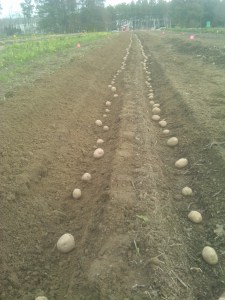At the Inter-Faith Food Shuttle, we provide opportunities for people from diverse backgrounds to learn sustainable agriculture, healthy eating, and healthy cooking practices from experts across the Piedmont. We facilitate shared learning opportunities for farmers, gardeners, and others to learn best practices, tips, and tools from one another.

One such learning opportunity took place on Saturday, February 11th. We held Part 2: Checking our Progress, the second installment of our three-part workshop series on Starting & Planning a Community Garden. You can read about Part 1 here.
IFFS teaches communities how to get healthy, nutritious food for themselves and supports shifting the food system paradigm so that everyone has access to enough nutritious food for a healthy and active life. Community gardens are a great way to do this! They help increase community health, wealth, and security and provide access to fresh, nutritious foods.
The workshop met at Alliance Medical Ministry, an acute and primary care clinic in east Raleigh where the Inter-Faith Food Shuttle has worked for the past 2 years to grow a community garden. Participants worked to fine-tune plans for their spring garden projects. The three part series is designed to be fun, interactive, and a place to meet others interested in similar projects. In every workshop we build upon knowledge gained from previous workshops, but they are great for any level gardener and open to any and all interested in community gardening!
This workshop was facilitated by Lakemont Swim Club Garden Coordinator and longtime IFFS volunteer Fred Woodward and began with a visualization exercise led by IFFS Wake County Community Garden Coordinator Amanda Soltes. Participants were asked to close their eyes and visualize themselves standing in their current garden space – to take a moment to feel, see and notice what is around them, then share the most prominent features of their garden space with the person next to them.

Abbey Piner, IFFS Nutrition Coordinator and NCSU MHS candidate Horticulture ’13, led the group in considering design aspects of their gardens. Participants practiced observation and analysis of their garden site, drew a basic ‘base map’ and identified a main goal or challenge.

Bart Renner, MS Crop Sciences, talked about the importance of soil testing and led the workshop participants outside to get their hands in the soil! He demonstrated how to properly take a soil sample and the procedure for sending in your samples to the NCDA. Participants then returned to their garden drawings to decide where they would take samples in their own gardens.

Cullen Whitley, Highland United Methodist Church Garden Coordinator, then spoke to the group about how to read NCDA soil test results and make amendments to your soil based on these results. The group had a lot of great questions as he discussed the importance of soil nutrients and pH.
Soltes led the group in a session on how to plan your garden in terms of cultivating both people and plants. Gardeners must plan for how people will be involved logistically in regards to leadership, maintenance and funding of the garden. In addition, planning includes how to utilize space in your garden, so square foot gardening and companion planting were highlighted as great ways to incorporate a good variety of plants in small spaces.

Woodard said of the workshop, "I was impressed with the variety of projects represented by the group of attendees. There was a 'lawn to food production' front yard, several community gardens, and even a 'garden to table' book project in the works. The most exciting thing to me is that all were committed to learning more about growing food and to getting a project started."
Ultimately, these garden projects will help increase food security in communities across the Triangle region as the workshop participants take what they have learned and bring that knowledge and skills into their communities to grow and to teach others to grow healthy, organic food to feed their families.
Look for details for the 3rd and final workshop in the series - TBA!


















